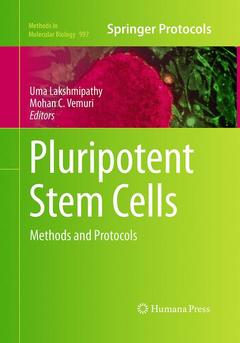Description
Pluripotent Stem Cells, Softcover reprint of the original 1st ed. 2013
Methods and Protocols
Methods in Molecular Biology Series, Vol. 997
Coordinators: Lakshmipathy Uma, Vemuri Mohan C
Language: English
Subjects for Pluripotent Stem Cells:
Publication date: 08-2016
Support: Print on demand
Publication date: 04-2013
292 p. · 17.8x25.4 cm · Hardback
Description
/li>Contents
/li>Comment
/li>
Human pluripotent stem cells such as human embryonic stem cells (hESC) and induced pluripotent stem cells (iPSC) with their unique developmental plasticity hold immense potential as cellular models for drug discovery and in regenerative medicine as a source for cell replacement. While hESC are derived from a developing embryo, iPSC are generated with forced expression of key transcription factors to convert adult somatic cells to ESC-like cells, a process termed reprogramming. Using iPSC overcomes ethical issues concerning the use of developing embryos and it can be generated from patient-specific or disease-specific cells for downstream applications. Pluripotent Stem Cells: Methods and Protocols highlights the best methods and systems for the entire work flow. Divided into four convenient sections, topics include a focus on producing iPSC from diverse somatic sources, media systems for expanding ESC and iPSC with detailed protocols for directed differentiation into specific lineages, commonly used cellular and molecular characterization methods , and the potential application of labeled stem cells with specific methods for cloning, gene delivery and cell engineering. Written in the successful Methods in Molecular Biology? series format, chapters include introductions to their respective topics, lists of the necessary materials and reagents, step-by-step, readily reproducible protocols, and notes on troubleshooting and avoiding known pitfalls.
Authoritative and easily accessible, Pluripotent Stem Cells: Methods and Protocols seeks to serve both professionals and novices with its well-honed methodologies in an effort to further our knowledge of this essential cellular feature.
Sources and Derivation of Human Embryonic Stem Cells.- A New Chemical Approach to the Efficient Generation of Mouse Embryonic Stem Cells.- A Review of the Methods for Human iPSC Derivation.- Generation of Human Induced Pluripotent Stem Cells by Lentiviral Transduction.- Generation of Induced Pluripotent Stem Cells with CytoTune, a Non-Integrating Sendai Virus.- Generation of Human Induced Pluripotent Stem Cells (hiPSCs) using Episomal Vectors on Defined Essential 8TM Medium Conditions.- Feeder-free Substrates for Pluripotent Stem Cell Culture.- Methods for Culturing Human Embryonic Stem Cells on Feeders.- Methods for Culturing Human Embryonic Stem Cells in a Xeno-Free System.- Directed Differentiation of Human Pluripotent Stem Cells Along the Pancreatic Endocrine Lineage.- Directed Differentiation of Pluripotent Stem Cells to Functional Hepatocytes.- Highly Efficient Directed Differentiation of Human Induced Pluripotent Stem Cells into Cardiomyocytes.- Generation of iPSC Lines from Human Normal and Neoplastic Blood Cells Using Episomal Vectors.- Cellular Characterization of Human Pluripotent Stem Cells.- TaqMan® OpenArray® High Throughput Transcriptional Analysis of Human Embryonic and Induced Pluripotent Stem Cells.- Epigenome Analysis of Pluripotent Stem Cells.- Single Cell Gene Expression Analysis of Pluripotent Stem Cells.- Profiling Stem Cells Using Quantitative PCR Protein Assays.- Labeled Stem Cells as Disease Models and in DrugDiscovery.- Cloning Technologies.- Stable Transfection Using Episomal Vectors to Create Modified Human Embryonic Stem Cells.- Site-Specific Integration in Human ESC Using Jump-In™ TI™ Technology.




